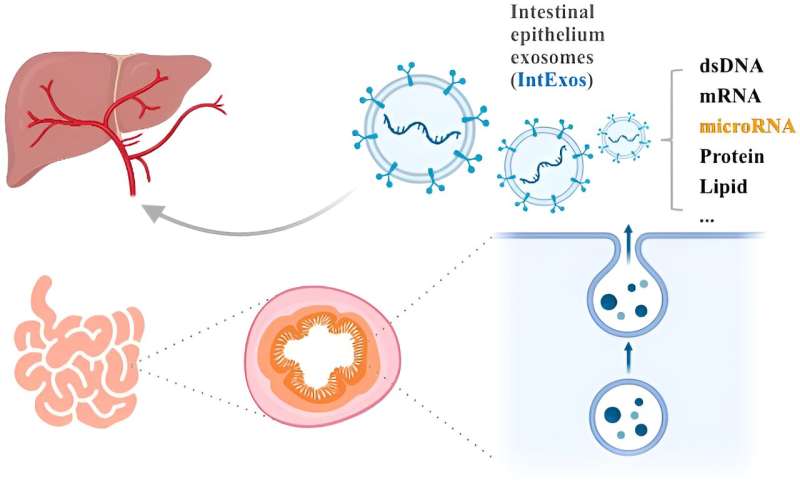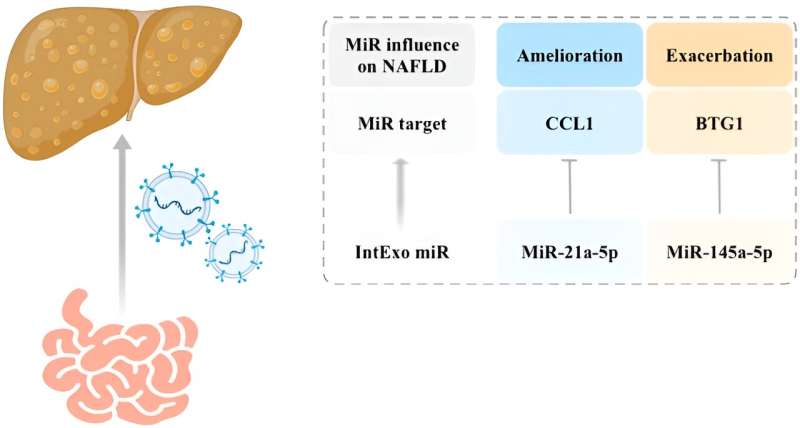This article has been reviewed according to Science X's editorial process and policies. Editors have highlighted the following attributes while ensuring the content's credibility:
fact-checked
proofread
Gut-derived exosomes as a novel mediator of hepatic lipid metabolism

Non-alcoholic fatty liver disease (NAFLD), characterized by excessive hepatic lipid accumulation, poses a high prevalence and can progress to cirrhosis and liver cancer. To enhance preventive and therapeutic efforts, an in-depth exploration of the regulatory mechanisms of NAFLD is imperative.
Given the close connection between the intestine and the liver, numerous substances regulating hepatic metabolism are either produced or absorbed by the intestinal tract. Exosomes derived from intestinal tissues have been reported to influence the biological process of receptor cells through their cargo, suggesting a potential role in regulating hepatic lipid homeostasis.
In a study published in Life Metabolism titled "Regulation of hepatic lipid metabolism by intestine epithelium-derived exosomes," researchers from Peking University confirmed that exosomes originating from intestinal epithelial cells (intExos) served as a novel mediator in regulating hepatic lipid metabolism and elucidated the partial mechanisms through the lens of microRNA.
To test the scientific hypothesis that "intestinal epithelium-derived exosomes regulate hepatic lipid metabolism," the uptake and enrichment of intExos by liver cells were confirmed using fluorescence tracking techniques.
Villin-Cre;Lgr4flox/flox (VL) mice, resistant to high-fat diet (HFD)-induced fatty liver due to genetic editing in intestinal epithelial cells, were chosen as a study model. IntExos from VL and control mice were collected and administered to hepatic primary cells as well as HFD-fed mice via tail-vein injection.

The results consistently showed a reduction in lipid deposition in liver cells treated with VL exosomes. microRNA sequencing of intestinal epithelial exosomes from VL and control mice revealed a significant increase in miR-21a-5p and a substantial decrease in miR-145a-5p levels in the VL group.
Overexpressing or silencing these microRNAs in liver primary cells and HFD-fed mouse livers confirmed that miR-21a-5p alleviates NAFLD, while miR-145a-5p exacerbates hepatic lipid degeneration. Potential target genes of miR-21a-5p and miR-145a-5p that mediate their effects on lipid metabolism were identified using prediction databases and validated through dual-luciferase reporter gene assay.
Further cell experiments demonstrated that miR-21a-5p downregulates C-C motif chemokine ligand 1 (Ccl1) in liver macrophages, inducing an anti-inflammatory phenotype and indirectly reducing lipid deposition in hepatocytes; miR-145a-5p inhibits BTG anti-proliferation factor 1 (Btg1), leading to an increase in downstream molecules such as stearoyl-CoA desaturase-1 (Scd1) and subsequent lipid accumulation.
Previous research on gut exosomes has predominantly focused on their roles in local conditions such as inflammatory bowel disease, or the systemic influence of exosomes from feces that closely relate to the intestinal microbiota.
This study addresses a critical gap in understanding how exosomes produced by intestinal cells regulate remote organs, by uncovering the uptake of small intestine epithelium-derived exosomes by the liver and elucidating the impact and mechanisms of their cargo miR-21a-5p and miR-145a-5p on hepatic lipid metabolism and inflammatory responses.
The assertion that "exosomes serve as a pathway for the intestine to regulate liver lipid homeostasis" provides new insights and potential targets for future prevention and treatment of liver metabolic disorders.
More information: Tiange Feng et al, Regulation of hepatic lipid metabolism by intestine epithelium-derived exosomes, Life Metabolism (2023). DOI: 10.1093/lifemeta/load044





















